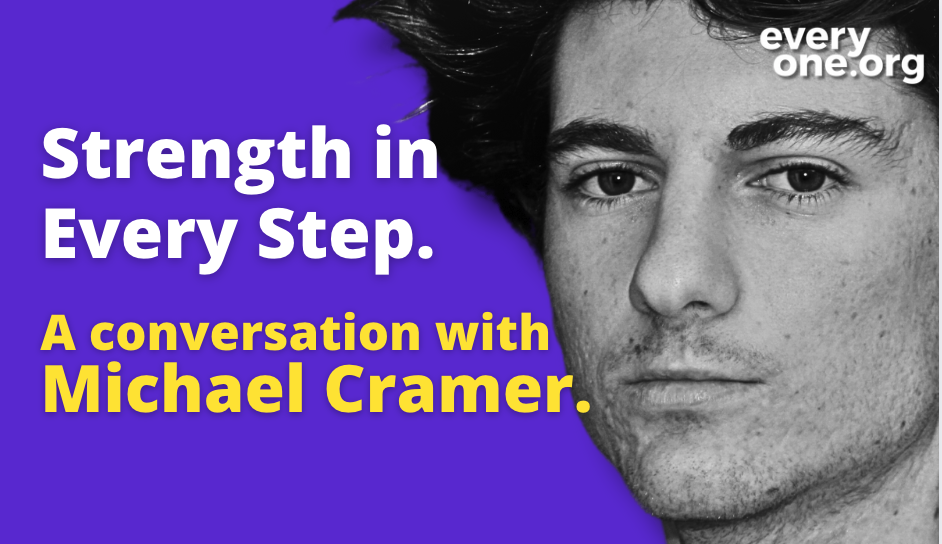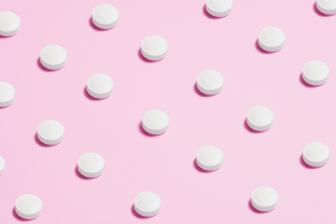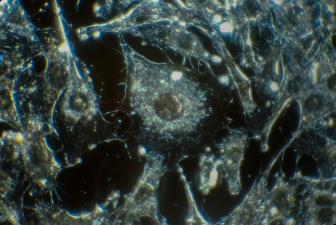Strength in Every Step: A Conversation with Michael Cramer
Last updated: 14 November 2024

You can legally access new medicines, even if they are not approved in your country.
Learn howIn a heartfelt interview, Michael Reid Cramer shares his remarkable journey through a rare cancer diagnosis and the challenges of living with chronic graft-versus-host disease (GVHD). From his athletic background and sudden diagnosis during the COVID-19 pandemic to his ongoing fight for access to treatment and support, Michael opens up about the physical and emotional tolls of his experience. Through it all, his unwavering commitment to helping others shines through as he reflects on his mission to inspire and empower fellow cancer patients.
Michael:
Hi, my name is Michael Cramer. I'm a cancer survivor and I live with chronic GVHD. Thank you so much for interviewing me today. I'm excited to share my story and hopefully inspire some people and spread some positivity.
Everyone.org:
As a start, perhaps you could share a little bit about your journey in the last four years from your diagnosis to where you are today.
Michael:
At 19, I was an athletic freshman in college, active in the gym, windsurfing, and sailing. I’d even been on the Olympic development team and competed globally. Life was good, and I was always healthy and active.
In March 2020, during the COVID lockdown in Miami, everything shut down—beaches, gyms, social life. I started feeling unusually tired, but I assumed it was just from lack of activity and isolation. Over the next few months, I continued feeling fatigued, but didn’t think much of it.
By early July, I began having fevers and night sweats. I thought the night sweats were just from the Miami heat, but eventually, they worsened. In late June, I went with my mom to see my pediatrician. She ordered blood work and referred me to a specialist, who eventually recommended a bone marrow biopsy after his tests showed something was wrong.
The biopsy confirmed I had leukemia or lymphoma, though it took four weeks for an official diagnosis of hepatosplenic T-cell lymphoma on August 3, 2020. We started chemo right away, and I was told I’d need a bone marrow transplant (BMT). I went through three intense rounds of chemotherapy before we proceeded with the BMT on October 27, 2020. My mom and I stayed in the hospital for six weeks as I underwent chemo and radiation, which made me incredibly sick.
After the transplant, I developed graft-versus-host disease (GVHD), where the donor cells attack my organs. For months, I was in and out of the hospital, with GVHD becoming chronic. Thankfully, it’s more manageable now, and I’m no longer hospitalized, but I still live with GVHD.
Everyone.org:
That's good to hear. Are you able to do more of your hobbies and activities that you loved doing before?
Michael:
I've been able to get back to some of them. It’s not the same as before, as my body has been through a lot, and it’s a little weaker than it was before. I can't really get sun, so there’s a lot I’m more limited on doing now, but I can still do the things I love, which is great.
Everyone.org:
If you look back to the beginning, you mentioned it took you a few months to first go to the doctor and see if there was something deeper than just fatigue going on. What do you wish you had known in those early stages? Would you have done something differently?
Michael:
Honestly, I don’t know if I would have wished to know anything different. I’ve never really thought about that. I think that I went at the appropriate time because I was healthy. I never had any health issues before, so being tired during the COVID lockdown wasn’t a huge deal for me at first. But if people are experiencing symptoms out of nowhere—like night sweats, fatigue, or fevers—you probably should go to the doctor, just to see what's going on if that's not normal for you.
Everyone.org:
I can imagine, too, that going through a cancer diagnosis and treatment at such an early age isn't when most people expect it. How has your age at diagnosis impacted your ability to advocate for yourself during treatment?
Michael:
I think if I was younger, I probably wouldn't have asked as many questions. But I was 19, so I was pretty self-aware and understood what was going on. I asked a lot of questions because I really wanted to know what was going into my body, how it was going to affect me, what I was going to feel like, what to look out for, and if the treatment they were giving me was the best option available.
Everyone.org:
In your story and your advocacy work, you share a message of positivity. Did you also experience any challenges with the healthcare system. Were there areas that could be improved?
Michael:
The biggest issue I’ve faced is insurance and the cost of treatment. When I was diagnosed, I had to switch from college insurance since I had to drop out. I lost that coverage and had to find new insurance. Now I’m on Medicare, but it has limitations, like not being able to earn much while still getting coverage for treatment.
I’m still undergoing treatment every few weeks and take daily medication for graft-versus-host disease (GVHD). The cost of medications is a major issue, and there are many hoops to jump through to qualify for insurance. To get on my current medication, I had to fail several treatments first, which is just the way it works. I wish I’d known this drug would work better, but I had to try others first, including steroids, before reaching this one. It was basically my last hope—and it worked. If we’d started with it earlier, maybe I wouldn’t have gone through everything else.
In the past, I had to actively ask my doctors about different treatment options. Now that I’m more stable, we’re considering new immunotherapies for my GVHD, as my liver is still not great, though better than before. None of the treatments worked initially, and trying different options felt like a shot in the dark. The standard treatments, like steroids, didn’t work for me. It’s hard to know what will work, and having a complex disease like this makes the experience even more challenging.
Everyone.org:
It's clear that you've worked hard to maintain a positive mindset, and that's what draws people to you. What advice would you give to those going through hard times, particularly on the mental side of things?
Michael:
I’d say that, whether it's cancer, GVHD, or any other health issue, there are moments when it feels like things will never improve. Sometimes, it just keeps getting worse, and you lose hope because it's been going on for so long. I’ve been there, and when you're at that low point, it can feel impossible to imagine getting out.
But if you could look into the future and see that there is hope, that things can get better, it might make it easier to keep going. Just think, "What if this next treatment works? What if things change, and I can find happiness again?" If I’d known two years ago how much better life would be now, I wouldn't have felt so sad or even considered giving up. There was a time when I wanted to stop treatment because it was so hard.
My point is, there's always hope for the future—hope for new drugs, hope for a shift that can change your life, and sometimes, that shift starts from within. You have to learn to manage the anxiety and find little things each day that bring positivity. Just keep going.
Everyone.org:
That’s a very important message. What overall role has mental health played in your recovery?
Michael:
Mental health is everything. If you’re not feeling well mentally, it’s hard to feel well physically, and it goes both ways. The physical impacts the mental, and the mental impacts the physical. Of course, your mindset alone won’t cure your disease, but if you have a growth mindset and try to view things from a positive perspective, you’ll experience life differently.
Mental health has been huge for me. When I was diagnosed, I started therapy right away because it was offered at my hospital, which was a key support. Connecting with a therapist was so beneficial, and I still go to therapy today because I’ve been through a lot of trauma—it hasn’t been an easy journey.
Taking care of your physical health is part of taking care of your mental health, and vice versa. Being active helps your mental state, and doing things you love, even if you’re in the hospital, makes a difference. I would build Lego or take little walks, which helped both my physical and mental well-being.
Meditation, for example, benefits your physical health by focusing on breathing and calming your nervous system, but it’s also a form of mental care. It really works both ways.
Everyone.org:
Being a patient, it can sometimes feel like you’re just a recipient of advice and treatment. It can affect your sense of agency. Are there any moments you felt truly empowered as a patient, not just a passive recipient of expertise or advice?
Michael:
It’s been more recent that I felt that way. For the first few years of dealing with cancer, I didn’t know much about treatment. When I was diagnosed, I mostly listened to the doctors. But recently, in the past year or so, I’ve learned more about my disease. I started discussing my treatment with my doctors, advocating for what I felt would improve my quality of life, like getting my knee replaced so I could be more active.
Over the past year, my quality of life has improved because I’ve chosen to prioritize it alongside treatment. I still listen to my doctors, but I now advocate for as much quality of life as I can. Going through a long-term illness like GVHD, it’s important to balance treatment with truly living as much as possible.
It’s something all patients should strive for, especially with long-term diseases—not just letting doctors prescribe anything but questioning why and asking if there’s a better option that might allow for a better quality of life. It’s always good to ask your doctor. Because they might put you on something and you might not say anything, but you hate it, and there could be another option. It’s important to ask your doctor if there’s something better you can do or a different treatment that could improve your quality of life. Just talk to them and ask questions to see if there's something that might be a better fit for you.
Arriving at this point has required spending time to understand the options myself before bringing them up with my doctors. It’s been more about the specifics of my case, with my liver, skin, mouth, and stomach being affected. My doctors come to me, and we discuss treatment options based on what I qualify for and what would be effective.
Everyone.org:
Do you feel that your age and having to experience everything so early on has affected your support system? Do your friends and peers understand your situation?
Michael:
I don’t think they understand my situation. My friends in the cancer world, people I’ve met online who have cancer, understand my situation, but my close friends, even the ones I had before cancer, don’t really get it. Maybe one of them understands a little, but not really. The people who truly understand are my mom, me, and those who are going through something similar.
Everyone.org:
Sharing your story has brought in a large audience, largely of other patients or caretakers, people who are closer to your situation. What have been the most eye-opening or surprising stories that people have reached out to you with?
Michael:
I’ve had a lot of people reach out with incredible stories, and it’s more common than you’d think. I’ve met others online with GVHD and the same cancer as me. My cancer is rare, but a few of them didn’t make it, which has been tough. Recently, two of my friends with GVHD and cancer passed away, as well as someone with a similar cancer diagnosis.
I get many messages with crazy health stories. I try to read as many as I can, especially from people who message me about cancer. I’ve had some great conversations and heard some inspiring stories. I also lead a weekly support group for cancer survivors and patients, and many people with similar experiences to mine join. It’s uplifting to see and hear their stories. A lot of them are my age, so seeing others' lives interrupted by cancer like mine was makes me feel less alone. It’s a beautiful experience, even though it’s not good that they have cancer—it still makes me feel normal.
Everyone.org:
We communicate with people going through all kinds of things, and sometimes it can get strange to me that we keep referring to “cancer journey”, “cancer warrior”, all of these terms that have become almost a given when discussing someone's situation. How do you feel about that terminology? Is there a better, more genuine way you would prefer people to talk about it?
Michael:
It depends on the person. Many use words like “fighting” or “battling,” but I don’t love those terms. They feel tough. To me, cancer isn’t a battle—it’s a journey. “Battle” can imply you're fighting something inside of you, but cancer is a part of you, and you want it gone, not to be in conflict with yourself. Saying “accept cancer” might sound like surrendering, but it’s not. It’s about accepting your circumstances and moving forward. I believe acceptance is key in situations like this.
That said, people respond well to “fighting” cancer—it sounds empowering to them. Sometimes, I’ll use the word because it resonates with others. But in reality, you have no power over cancer. You can’t control whether you survive. It’s about treatment and luck. You don’t have control, no matter how hard you try. It’s more about accepting what’s happened and moving forward as best as you can.
Everyone.org:
Where does Michael want to be in the future?
Michael:
I want to be doing motivational talks with my mom, doing more on social media. I’ve struggled so much, and I still struggle a lot. And I think that I wanna devote my life to just helping other people. Because we've been helped so much, and I've suffered so much, and there's always something going on with my health. I truly believe that I was put through this to show others the way. That’s just the way I see life. I wanna help people, and that’s all that it is to me.
Everyone.org:
As a closing, do you have any message for people who reach out to Everyone.org who are struggling to access treatments that could potentially help them but aren’t available in their home countries?
Michael:
Yes, visit Everyone.org to learn about the amazing work they're doing. Also, talk to your doctors—they have access to many resources and are well-connected. They have colleagues in other hospitals and even around the world who know different treatments. Do your research and find out what’s available because there’s likely a second line of treatment or another doctor who can approach your case differently.
Remember, there’s a lot of support out there, including mental health resources. Consider finding a therapist or joining an online support group. There are communities of people facing similar challenges who will welcome you. It may take some effort, but don't forget, support is out there. Just don’t give up.
-------
If you want to find out more about Michael and his advocacy work, check out his website. And if you're in need of mental support, you can join his public cancer support group.




